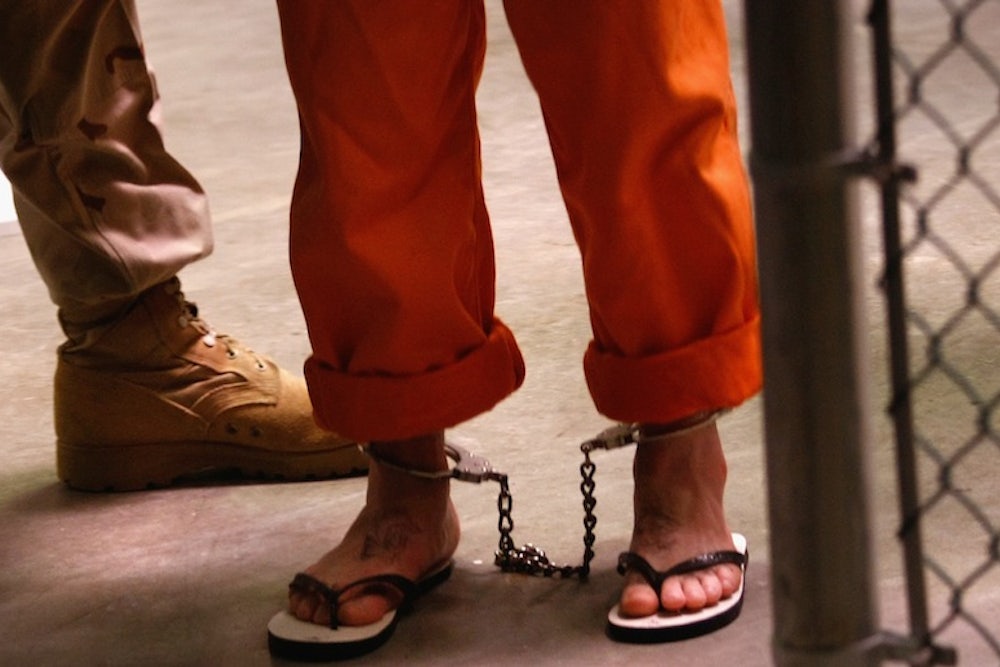“Safe. Humane. Legal. Transparent.” That’s how the U.S. government characterizes its prison at Guantánamo Bay. But in the twelve years that it has been in operation, Gitmo has become notoriously linked to torture, indefinite detention, and government secrecy.
The U.S. has defended the prison's legality by saying that while at war with Al-Qaeda and the Taliban, they have the authority to detain people suspected of being members of either group. Under international law of war, it is legal to detain enemy combatants without charge because it is considered preferable to killing them. However, because the purpose of detention is strictly to remove combatants from the battlefield, the conditions of imprisonment cannot be punitive in nature. Common article III of the Geneva Conventions, which deals with conflicts involving non-state actors, forbids detention practices that are cruel, degrading, or humiliating.
Non-punitive detention is possible, even in places that house some of the world’s most notorious people. The International Criminal Court at The Hague operates a detention center at The Hague, which holds accused war criminals as they await trial. ICC detainees have included accused Serbian genocidaire Slobodan Milošević and Congolese warlord Bosco Ntaganda. As explained on the detention center’s website, “If convicted of crimes under the jurisdiction of the ICC, they do not serve their sentences at the ICC Detention Centre, as it is not a facility made for the purposes of managing a regime of convicted prisoners; they are transferred to a prison outside of the Netherlands to serve their time.”
Camp seven, the facility which holds the high-value detainees at Guantánamo, does not have a website, and details about conditions inside the camp are highly classified. In 2009, Admiral Patrick M. Walsh conducted a review of Guantánamo and compared Camp seven to a SuperMax prison—a facility specifically designed to punish convicted criminals.
The legal requirements for the detention facilities at The Hague and at Guantánamo are identical, but the conditions of imprisonment are nothing alike.
THE HAGUE
GITMO
Daily Life
Prisoners are locked in a single occupancy cell overnight from 9 p.m.-7:30 a.m. For the rest of the day, they are free to move around the facility, which includes a communal kitchen, a library, a gym, soccer and tennis courts, a spiritual room, and a computer lab.
Camp 7 prisoners live in solitary confinement where they cannot socialize with each other. According to the 2009 Walsh review, detainees are allowed in a recreation room for four hours a day with one other prisoner. They are also given three weekly visits to a media room with books, movies, and video games.
Contact with Family
The Hague permits visits from family members, and even assists with travel expenses if the prisoner qualifies as “indigent.” Thanks to conjugal visits, Liberian warlord Charles Taylor fathered a child while imprisoned at The Hague in 2010. Prisoners can also make phone calls and send letters.
Visits and phone calls are not allowed. The International Committee of the Red Cross can deliver letters to and from family members, but communication is limited by a slow declassification process and limited visits by the ICRC to Guantánamo.
Access to Lawyers
Prisoners can communicate with their legal defense team in person, over the phone, or electronically. They have a computer in their cell that is linked to a computer that is only accessible by their legal counsel. Lawyers can upload relevant documents and prisoners can instantly send back comments. Though the ICC monitors other communications, conversations between prisoners and their defense team is considered privileged communication that cannot be monitored.
Prisoners can only communicate with their defense counsel in person at a nearby facility (lawyers cannot visit their clients in the highly classified Camp seven). Lawyers have to travel several hours by plane to get to Guantánamo. Although attorney-client conversations are supposed to be private, defense lawyers have identified listening devices in the meeting rooms disguised to look like smoke detectors.
Religious Rights
There is a spiritual room where prisoners can participate in solitary or group prayer. The detention facility will also arrange visits from a minister or spiritual advisor.
Detainees are fed halal food, given a copy of the Koran, and are allowed to pray. However, solitary confinement prevents them from group prayer, a fundamental part of Islam.
